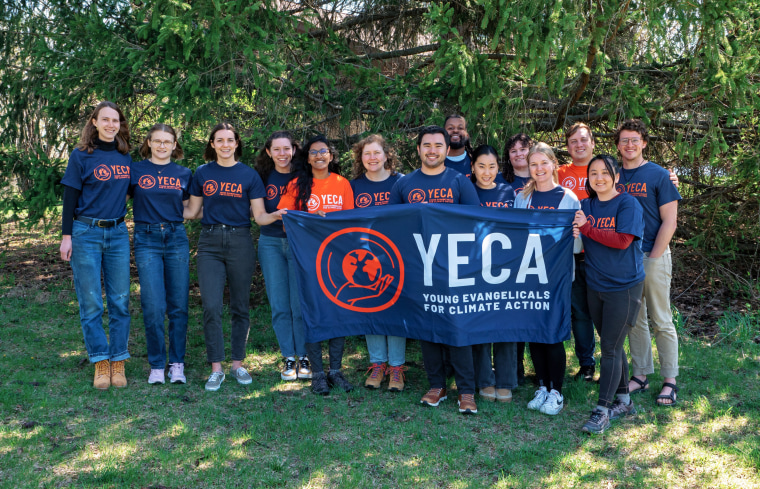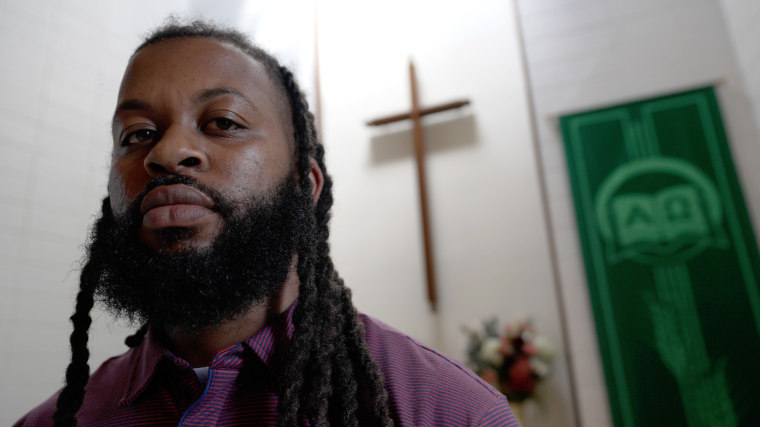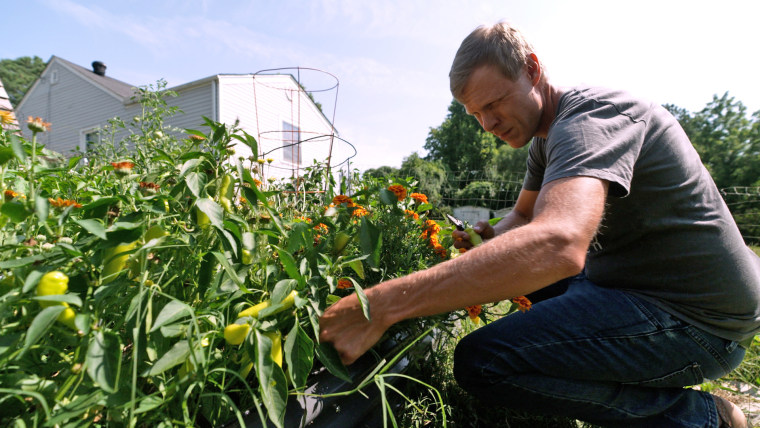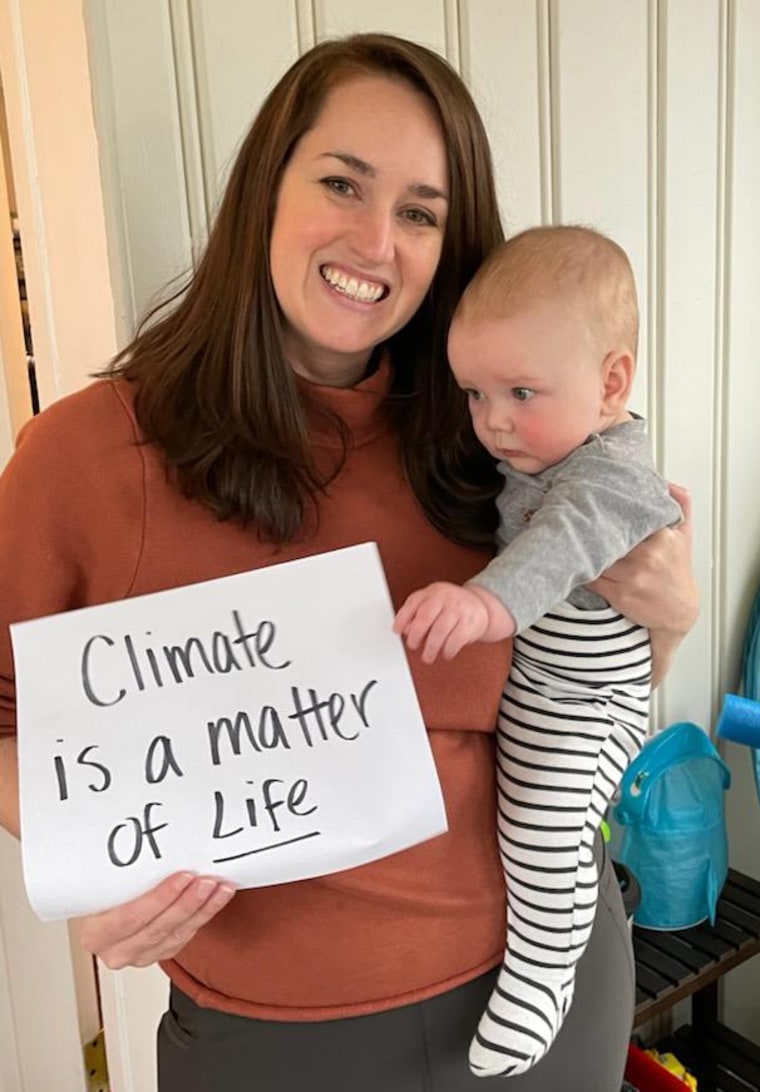The Summary
- A group of young evangelical Christians plans to campaign at religious colleges to persuade students to consider climate change at the ballot box.
- It is part of a small group within the evangelical community that combines Christian ethics with environmental action.
- The effort comes as Donald Trump continues to court evangelical voters by calling climate change a “hoax.”
When evangelical student groups seek climate votes at their Christian colleges later this month, they will have the tagline: “Love God, Love Thy Neighbor, Vote Climate!”
It is the first in-person campaign on campuses organized by the non-partisan group Young Evangelicals for Climate Action since it was founded in 2012.
The volunteers – members of chapters at six Christian colleges – aim to draw connections between communities affected by the climate crisis and the Christian mission of “loving your neighbor” and helping those in need.
The project is part of a larger movement run by the Evangelical Environmental Network, a faith-based environmental organization.
Its members are few in their community: A 2022 survey from the Pew Research Center found that evangelical Christians are the most likely among US religious groups to express skepticism about human-caused climate change.
In the 2020 election, 84% of white evangelical Christians voted for Donald Trump — who in the past has called climate change a “hoax,” contradicting decades of scientific consensus. As recently as last week, Trump falsely claimed that “the earth has been getting a little cooler lately,” and called climate change “one of the biggest frauds of all time” at a Sept. 29.
White evangelical voters made up a third of the electorate that defeated Trump in 2016, and a Pew Research poll released last month found that 82% said they would do it again this year.
However, Jessica Moerman, CEO of the Evangelical Environmental Network, is committed to making Christians see climate change as a matter of love for the Earth made by God, as she explains.
“As evangelicals, we have this biblical mandate to care for God’s creation,” said Moerman, who is also a pastor and climatologist. “And in the 21st century, that means taking action on the climate.”
Moerman said he has seen an increase in interest in weather from evangelicals who have experienced bad weather. So his group is starting to look more closely at making connections between climate change and intensifying storms and wildfires, he said.

Young Evangelicals for Climate Action is a ministry of the Evangelical Environmental Network, and colleges that plan to participate in the campaign include Indiana Wesleyan University in Indiana and Olivet Nazarene University in Illinois. But group work goes beyond that. Adam Hubert, a middle school science teacher at the faith-based Hope Academy GSO in Greensboro, North Carolina, is a member. He integrates climate science into his middle school lessons in biology and environmental science.
This spring, the class took a trip to the Blue Ridge Mountains to learn about how climate change can affect forests and wildlife.
Hubert said many of his students tell him that school is the only place they talk about climate change.
“I hope that my students will leave my class respecting nature,” he said. “So when they turn 18 and go to the ballot box or talk to their neighbors, they might think about it.”

Most of Hope Academy’s 130 students come from low-income families of color. Hubert said climate denial rhetoric from some prominent evangelicals does not represent the behavior of the school community.
“I believe that white evangelicals have this ability to deny or pretend that something doesn’t exist,” he said. “I think we see it with racial injustice. I think we saw it in the plague. And we see it with the climate crisis. “
Moerman sees climate denial among evangelical Christians as a product of misinformation.
“Unfortunately, it was my community of evangelicals that was one of the targets of the wrong information,” he said.
Some conservative evangelical politicians have been promoting skepticism about climate change for years. Jim Inhofe, the late Republican senator from Oklahoma, presented snow to the Senate a decade ago as evidence that “only God can change the weather.” And last year, former Arkansas Governor Mike Huckabee published a Christian children’s book denying human-caused global warming.
To combat such ideas, the Evangelical Environmental Network hosts webinars on the science of climate change and how faith relates to climate action. Volunteers run faith-based children’s camps and facilitate times of obedience in Christian communities affected by the climate crisis.
A landmark document by the group Pro-Life Clean Energy Campaign makes a push to combat air pollution as a way to protect premature babies, given research showing pollution can raise the risk of premature birth and low birth weight. A petition related to this campaign has received more than 2 million signatures.
The Internet also connects with pastors and preachers, providing guidance on how to incorporate climate discussion into the sermon.
Caleb Haynes, pastor of a small church called Kaleo Nashville in Nashville, Tennessee, is among the network’s members. He believes it’s a Christian duty to think about the weather when voting – and he preaches accordingly.

“It is the year 2024, and Christians are not the only ones talking about apocalyptic times,” he told his congregation at a Sunday morning prayer in July. “As the glaciers are melting and sea levels are rising, and greed wants to run the show, God’s people must come!”
Haynes does not support other candidates, focusing on the relationship between Christian teachings and caring for the earth.
“Some pastors seem to be stopped talking about climate change, but for me, biblical faithfulness 101,” he said in an interview. “Our original sin here was to imagine that we eat, any way we want, any way we want, from any tree in the garden we want, and that there will be no consequences.”
“We are talking about the future of life on earth and the lives of millions of people,” he added.

Haynes and Moerman said they see climate change as a childcare issue.
“As evangelicals, we are called to protect the life of one child,” Moerman said. “And to really do that, we need to think about the climate – because our children, born and unborn, are the most affected by the climate.”
Trump appealed to the evangelical vote in his campaign by speaking at Christian rallies, with success: Trump voters appeared at a March rally in Ohio wearing gear emblazoned with the slogan “Jesus My Savior, Trump My President.” At a rally Trump held in Montana in August, many evangelical attendees said they saw the failed assassination attempt as “divine intervention.”
Despite that, Moerman said, he still sees evangelicals as an important, unspoken vote in the fight to tackle climate change.
“We only promoted a small majority,” he said. “To solve a problem as big as the climate, we need everyone.”
#Environmental #evangelists #push #climate #votes #election #approaches #Save #Gods #creation